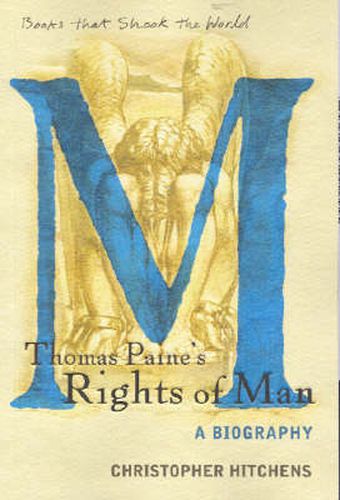Readings Newsletter
Become a Readings Member to make your shopping experience even easier.
Sign in or sign up for free!
You’re not far away from qualifying for FREE standard shipping within Australia
You’ve qualified for FREE standard shipping within Australia
The cart is loading…






My country is the world and my religion is to do good.‘ Thomas Paine, writing in Declaration of the Rights of Man (1791)
Thomas Paine is one of the greatest political propagandists in history. Declaration of the Rights of Man, first published in 1791, is the key to his reputation. Inspired by his outrage at Edmund Burke’s attack on the uprising of the French people, Paine’s text is a passionate defence of man’s basic and irrefutable rights.
In Rights of Man Paine argued against monarchy and outlined the elements of a successful republic, including public education, pensions and relief of the poor and unemployed, all financed by income tax. Since its publication, Rights of Man has been celebrated, criticised, maligned and suppressed but here the polemicist and commentator Christopher Hitchens, Paine’s natural heir, marvels at its forethought and revels in its contentiousness. Above all, Hitchens demonstrates how Thomas Paine’s Rights of Man forms the philosophical cornerstone of the greatest republic in the history of the world: the United States of America.
$9.00 standard shipping within Australia
FREE standard shipping within Australia for orders over $100.00
Express & International shipping calculated at checkout
My country is the world and my religion is to do good.‘ Thomas Paine, writing in Declaration of the Rights of Man (1791)
Thomas Paine is one of the greatest political propagandists in history. Declaration of the Rights of Man, first published in 1791, is the key to his reputation. Inspired by his outrage at Edmund Burke’s attack on the uprising of the French people, Paine’s text is a passionate defence of man’s basic and irrefutable rights.
In Rights of Man Paine argued against monarchy and outlined the elements of a successful republic, including public education, pensions and relief of the poor and unemployed, all financed by income tax. Since its publication, Rights of Man has been celebrated, criticised, maligned and suppressed but here the polemicist and commentator Christopher Hitchens, Paine’s natural heir, marvels at its forethought and revels in its contentiousness. Above all, Hitchens demonstrates how Thomas Paine’s Rights of Man forms the philosophical cornerstone of the greatest republic in the history of the world: the United States of America.